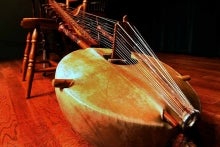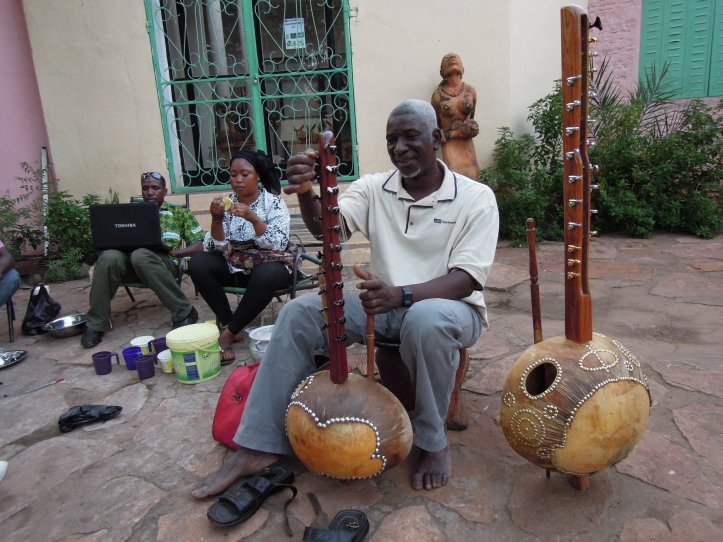Afropolitanism à la malienne

What is “Afropolitanism?” For most of its supporters and critics, this neologism in the Africanist lexicon connotes an elite cultural sensibility, celebrated by some as a sign of an artful and urbane African worldliness and derided by others for merely putting a new twist on an old idea of Africa, freshly packaged and adorned for consumption in upscale shops and trendy art galleries from London to Accra. I will not dwell on these debates here, as they have been well argued in other public forums (see, for example, Dabiri 2014 and Tveit 2013). What interests me is an approach to the Afropolitan that derives its force from the forms, styles, affects, and ideologies of a vital and vocal popular culture in contemporary Africa. Such an Afropolitanism suggests a mode of African being that articulates multiple social positions—professional and aesthetic, religious and diasporic, political and economic—as rooted as they are routed, as localized as they are worldly. A case study from my research on Malian music in contemporary Bamako (Skinner 2015) will elaborate this perspective.
An Afropolitan Muse
Consider the life and work of Madina Ndiaye. Madina is a pious Muslim, self-proclaimed tomboy, and, before loosing her eyesight to an infection of the optic nerve in 2003, a skilled tailor with a keen sense of fashion. But in Mali, Madina is mostly known as a professional kora player, a master of the 21-string Mande harp, an instrument she began to play as an adult in the early 1990s. “The kora,” she says, “came to me in a dream.” In this dream, Madina sits alone, dressed in a black robe illuminated by spotlights, on the stage of the French Cultural Center in downtown Bamako, giving a performance rooted in the rich patrimony of Mande music (Biarrat and Pegeault 2008). Motivated by a sense of destiny, Madina sought out instruction. She first went to Mali’s National Arts Institute, which then housed the country’s sole school of music, only to find that the kora professor was on indefinite leave. Undeterred, Madina took a more time-honored approach, arriving at the doorstep of the late Sidiki Diabaté, one of the first artists to introduce and popularize the kora, an instrument of the western Mande world, to Mali in the mid-20th century (Ndiaye 2007).
The Diabatés are a renowned family of griots, or in Bamana, the local lingua franca, “jeliw,” Mande artisans practicing the traditional art of musical praise and storytelling known as “jeliya.” Yet, their tradition is, to borrow a borrowed phrase from Christopher Waterman, “a very modern tradition” (1990). When Madina first visited the Diabatés in 1990, Sidiki, known throughout West Africa as “the king of the kora,” was a senior member of Mali’s National Instrumental Ensemble (a group he helped found after independence in 1960). His elder son, Toumani, who inherited the title of “prince,” was a rising star on the world circuit (who, in 2006, won a Grammy Award with the late Ali Farka Touré). Like any other student seeking to learn the kora in the Diabaté household, Madina was asked to present five hundred CFA (about one dollar) and ten kola nuts to the elder Sidiki to begin her studies, but Madina was not just another kora student.
First, the kora is an instrument of the jeliw, and, if one follows Mande discourses of authenticity, one does not simply become a jeli; one is born a jeli. And, Madina, who bears the noble surname Ndiaye, is not a jeli. The Diabatés respect this cultural claim to musical heredity but have made many exceptions over the years, for non-griots from abroad (like me) and in Mali (like Madina). Today, Toumani proudly proclaims that his son Sidiki (his grandfather’s namesake) is the seventy-second generation of Diabaté kora players (“transmitted,” he says, “from father to son”), but he is no less proud of the fact that the instrument now enjoys a vast following of fans and devotees—in Mali, Africa, and throughout the world. Second, the offering of ten kola nuts to the family patriarch presents its own complicated story. This is a gift that a young man typically presents to the family of the woman he intends to marry. When the elder Sidiki accepted the bundle of bitter nuts and legal tender from Madina, she became “engaged” to the kora, an instrument locally understood to be gendered female – an object of masculine musical mastery in a patriarchal society. That such an engagement might be called “symbolic” does not diminish its importance, or, in Madina’s case, its controversy.
As her musical mentor Do Dembelé puts it: “Madina not only challenged the griots, she challenged an entire society. Because, what she has done changes peoples ways of thinking, their modes of seeing and understanding.” “She’s a bulldozer,” says close friend and kora teacher, Dialy Mady Cissoko. “When she wants something, all else gets pushed aside” (Biarrat and Pegeault 2008). Still, criticisms of her gender, sexuality, and birthright have been frequent and severe, most recently using her loss of sight as a sign of social and cultural transgression. Reflecting of these personal attacks, Madina shifts the blame from self to society. “It’s a great shame for Mali,” she tells me. “Others say, ‘she’s not a griot.’ But ‘griots’ and ‘nobles,’ we are all the same! It’s on this world that we’ve created the griots. God did not create that. ... So I don’t give a damn about such things. In my family, we don’t tolerate any form of racism. I learned my humanism from them” (Ndiaye 2007).

Dialy Mady Cissoko, at the Institut National des Arts in Bamako, Mali.
This tolerant but critical, confident yet respectful, traditional and modern humanism resounds in Madina’s music and artistic persona, in the cycling bass patterns and punctuated solos of her kora performance; through her lyrical praise of women’s dignity and criticism of self-interest among “people today;” in her impeccable sense of stage fashion and sassy embrace of her voluptuous figure; and in her repeated proclamation to audiences, at home and abroad, that “regardless of where we come from or where we live, we are all immigrants!” This social and musical humanism can also be heard in Madina’s public advocacy of the status and identity of artists in Mali today. As a society, she argues, Mali does not do nearly enough to support its musicians, relying instead on the global culture industry to determine and promote artistic value. In her words: “In Mali, if you have not travelled abroad, people won’t give you the time of day. But as soon as you’ve come back from Europe, you’re considered a star! ... There are great artists here, who have never toured [abroad]. They sing marvelously well. But they struggle to make their demo, to get their songs out. Still, they don’t give up. I think we should encourage them instead of creating a clan just for the divas and stars. ... It’s Mali that needs to give value to its artists, before Europe” (Biarrat and Pegeault 2008).
A report on Mali’s national television about a documentary on Madina Ndiaye’s musical life and work.
Afropolitan Antiphony
Madina Ndiaye’s humanistic perspective on music and society emerges from an emphatically popular approach to the arts, politics, and urban social life in Africa today. The Malian art world of which she is formative part is irreducibly plural, full of aspiring stars and workaday groups, traditional griots and modern artists; it is politically engaged, confronting the promiscuous realities of everyday governance with poignant criticism and activism; and it audibly addresses a broad public of everyday urbanites, who are engaged in a common struggle to get by and make do in a world fraught with precarity and, at times, hostility. In this way, Madina’s self-described humanism resonates with Achille Mbembe’s recent account of Afropolitanism. To conclude and further clarify this popular mode of African being-in-the-world, I put musician and historian in dialogue, in an Afro-centred call-and-response across the academy and arts.
In his book, Sortir de la grande nuit, Achille Mbembe presents the Afropolitan as part of a broader vision of African renaissance beyond the structures and disjunctures of postcolonial society (2010: 229). Afropolitanism represents, for him, a “cultural sensibility, historical and aesthetic” characterized by “the awareness of this imbrication of here and elsewhere, the presence of the elsewhere in the here and vice versa.” For Madina, this is an awareness of domination and subordination in the Malian culture industry, of orientations toward Europe and aspirations for Africa. Mbembe continues, “this relativization of roots and primary belongings and a way of embracing, fully cognizant of origins, the foreign, the strange and the distant.” This is Madina “not giving a damn” about distinguishing between griots and nobles, but it is also her respect for the rich musical heritage she aspires to learn. Again, Mbembe, “this capacity to recognize oneself in the face of another and to value the traces of the distant within the proximate.” “No matter where you come from or where you live,” Madina tells her audiences, near and far, “we are all immigrants!” And, Mbembe adds, “to domesticate the un-familiar, to work with all manner of contradictions.” This is the insult and injury that accompanies a woman’s journey to master a man’s instrument and make music that breaks with insular inheritances.
And this, finally, is the Afropolitanism of a popular musician in Mali today.
A music video for Madina Ndiaye’s “Mali,” a vocal and instrumental praise song to the country she calls home.
References
Dabiri, Emma. 2014. “Why I’m not an Afropolitan.” africasacountry.com, 21 January.
Mbembe, Achille. 2010. Sortir de la grande nuit: essai sur l’Afrique décolonisée. Paris: Editions La Découverte.
Ndiaye, Madina. 2007. Interview with the author. Bamako, Mali. 3 May.
Skinner, Ryan T. 2015. Bamako Sounds: The Afropolitan Ethics of Malian Music. Minneapolis: University of Minnesota Press.
Tveit, Marta. 2013. “The Afropolitan Must Go.” africasacountry.com, 29 November.
Waterman, Christopher. 1990. “‘Our Tradition Is a Very Modern Tradition’: Popular Music and the Construction of Pan-Yoruba Identity.” Ethnomusicology 34(3): 367-379.
Ryan Thomas Skinner studies the local and global music cultures of contemporary Africa and its diasporas. His research addresses issues of popular culture, ethics, aesthetics, urbanism, public piety, cultural politics, nationalism, and the idea of Africa in the world today. He is the author of the book Bamako Sounds: The Afropolitan Ethics of Malian Music (Minnesota, 2015) and is currently conducting fieldwork for a project titled, “Race, Politics, and Performance in Afro-Swedish Public Culture” funded by the ACLS Charles A. Ryskamp Fellowship, and scholarships from the American Swedish Institute and the American Scandinavian Foundation. Skinner is an assistant professor of ethnomusicology at The Ohio State University.





